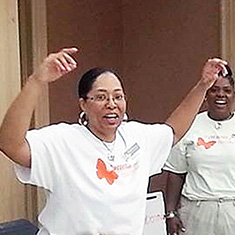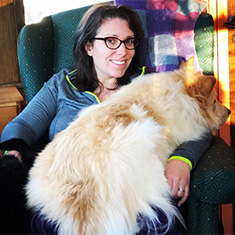2018 Schwab grant recipients taking active role in youth development
July 6, 2018 — Two Grinnell College alumni will pay tribute to a community-minded classmate while carrying out projects that benefit children’s development.
Shannon Hancock ’92 and Amy Ariel ’97 are the 2018 recipients of the Lori Ann Schwab ‘95 Alumni Grants. The grants recognizes the ongoing community service of Grinnellians who were at the College with Schwab.
Schwab was committed to making the world a better place by helping others. Her life was cut short by a sudden illness while she was studying in London in 1994.
“I am grateful and excited to receive the grant, and I feel honored to be doing this work in Lori’s name,” Ariel says.
The grant provides $1,500 stipends to support specific community service projects that recipients are significantly involved with.
 Shannon Hancock ’92
Shannon Hancock ’92
Hancock is the founder and executive director of The iMatter Experience, which provides fun, creative spaces where girls connect to positive adults who empower them to be confident, contributing members in the world.
“We ultimately want to mentor and connect girls either in one-to-one or small group settings,” Hancock says. “This grant gives us a greater reach to add more girls to The iMatter Experience and deepens the types of connections we can establish with our current girls.”
During her freshman year at Grinnell, Hancock participated in Alternative Happy Hour. A group of students traveled by van to Des Moines community centers on Fridays to work with kids.
“It was something that I totally fell in love with,” Hancock says. “It really opened something up in me, and I heard that call for youth development. It continues to be a life calling.”
Hancock played basketball at Grinnell and eventually served as an assistant women’s basketball coach for the Pioneers. She later moved to the Kansas City area where she served as a pastor. Today she is director of admissions and communications at the Saint Paul School of Theology in Overland Park, Kansas.
The iMatter Experience stemmed from Hancock’s work with third- and fifth-grade girls who had problems getting along with one another or had problem with relationships at home or school. The first iMatter Experience event was in 2013.
“We help girls navigate personal growth and relationships,” Hancock says. “We set out to develop space where parents or guardians are integral to what we do. We thought if we had children and adults hear the same thing, they could work together. It’s worked wonders.”
Parents and guardians also play a key component in Ariel’s project to develop sexuality education curriculum and resources for seventh-grade students at Northeast College Prep in Minneapolis.
 Amy Ariel ’97
Amy Ariel ’97
For example, one assignment will asks student to interview their parents or guardians about their sexuality values and the rules in their families.
“This also helps the adults at home have a better picture of what’s going on in the world,” Ariel says. “The parents of fifth- and sixth-graders I previously worked with learning about puberty were freaked out at first, but by the middle of the program they were enthusiastic advocates because they had experienced meaningful conversations within their kids.”
Ariel has worked as a lawyer, youth worker, Jewish educator, and sexuality educator. She also is an author and volunteer, having assisted Northeast College Prep for the past four years. She was talking with the assistant principal about ways to continue her volunteerism in developing the sexual education curriculum. Since it required concentrated time, Ariel couldn’t run the program herself.
“We were thinking how could we get this curriculum started over the summer so that the teachers can take it and fly with it next school year,” Ariel says. “The Schwab grant was just the right size for what we needed over the summer to make it happen. It was the perfect solution to the problem we were trying to solve.”
The charter school has diverse programs and a diverse student population. It was designed by two educators to focus on how to set students up for success in life.
“The school wanted to create a sexual education program that was science based but also had a social and emotional learning piece that would teach the values of relationships and what it means to have personal boundaries,” Ariel says. “This is all being done in a cultural context where everyone is coming from really different places.”
Ariel said she appreciates the opportunity to convey a value she learned at Grinnell.
“When we are out in the world and there’s something that needs to be done, there’s probably a way to get it done,” Ariel says about problem solving. “This is a great example.”
— by Jeremy Shapiro